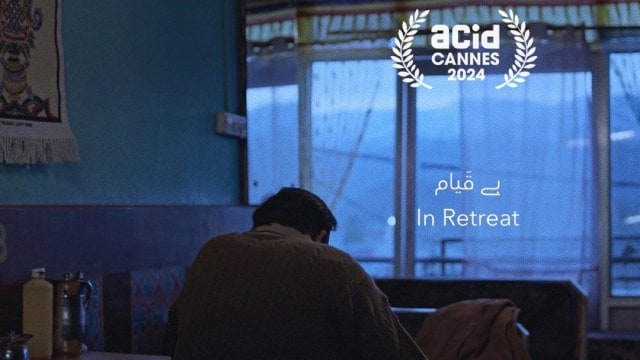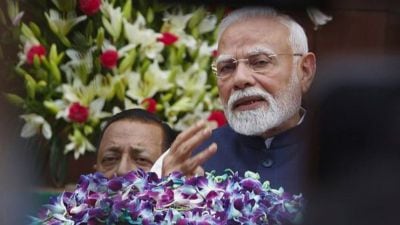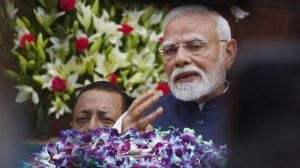Click here to join Express Pune WhatsApp channel and get a curated list of our stories
Maisam Ali scripts history at Cannes: ‘In Retreat’ was made with huge lack of resources’
In Retreat was the first Indian film to be screened at Cannes International Film Festival at the ACID Cannes sidebar programme that ran between May 15 to 24.
 As intriguing as it sounds, a lot went into the making of this 75-minute film set in Ladakh.
As intriguing as it sounds, a lot went into the making of this 75-minute film set in Ladakh.The Cannes International Film Festival, 2024, came with a big win for independent Indian cinema. ‘In Retreat’ by filmmaker Maisam Ali was screened at the ACID Cannes sidebar programme that ran between May 15 to 24. It was the first time an Indian film was screened in the section run by the Association for the Diffusion of Independent Cinema, since its inception in 1993. A total of 14 filmmakers had viewed several hundreds films and finalised nine from different countries for the category.
“It’s a nice section where they do more unconventional fragile films, the ones that need support, these kinds of films, their existence is very fragile, you don’t make money out of them, in that sense it’s very important to value something like that,” said Ali about the selection.
‘In Retreat’, in the words of the director himself, “follows the footsteps of a man into the crossing of a night. Somewhere between the end of autumn and the start of winter, the absent one returns home to a small town in the mountains. Now in his 50s, always away and late, having missed his brother’s funeral, he lingers at the threshold of the old home – what else can he attain other than delaying one more night of his arrival”.
 Maisam Ali talks to The Indian Express about his film and the challenges in its making, the drive towards the risk of independent cinema making, the importance of attaining a milestone at Cannes, his days at FTII and much more.
Maisam Ali talks to The Indian Express about his film and the challenges in its making, the drive towards the risk of independent cinema making, the importance of attaining a milestone at Cannes, his days at FTII and much more.
As intriguing as it sounds, a lot went into the making of this 75-minute film set in Ladakh. There is also a lot to Ali’s journey as a filmmaker and his ideas of making films that are closer to life. Born in Iran, Ali spent his formative years in Ladakh, went from being an engineering student to one at the Film and Television Institute of India (FTII) in Pune.
He talks to The Indian Express about his film and the challenges in its making, the drive towards the risk of independent cinema making, the importance of attaining a milestone at Cannes, his days at FTII and much more.
Q. This theme of coming home and the conflicting feelings of loss and belonging have been a recurring one in literature and cinema. It has always found an audience that resonates through works of authors like Amitav Ghosh, Salman Rushdie and many more. Do you think the choice of the theme played a role in the recognition it got?
Maisam Ali: The plot or the theme doesn’t determine the whole thing. It is always an artwork in its entirety and how you experience the whole of it. Especially in these kinds of films, which are intimate and personal, where the plot doesn’t give away anything about the film. You can talk about a drama film, through its plot. But my kind of films, when you watch them in its entirety, the viewer will have some kind of an experience. It is an experience even for the maker of the film. I have put certain things together, it is more of a fragmented work, which I have pieced together like a painting. So the theme doesn’t matter. Of course it exists and the plot can be explained for the sake of it, but the entire feel of it cannot be put into words.
Q. Since you were an engineering student, was filmmaking always an interest or was it something you found eventually?
Maisam Ali: I was studying engineering like so many people who go to engineering and then wish to do something else. But then I got interested in filmmaking. When I tried making something, it got very serious and I thought I should study it and found out about FTII. So I went there. For me it was like a rediscovery of myself. It has more of an art school feel, where you discuss and experiment and you get the freedom to do whatever you want to do and that freedom is very important to me. Even in my film there is no particular structure. So it became a place where I discovered my inner world and now I am just trying to do more personal and poetic cinema.
Q: What kind of work did you produce at FTII as part of your assignments?
Ali: We had to make short films every year – fiction and non-fiction. It is a very serious kind of work that we do there. They are usually really good short films which go to film festivals. This year also at Cannes, a student’s short film has been screened. During my time at the institute, I made a film titled, ‘Far in NIght’. It is just about the journey of a small group of adolescent football players, a school team going for a match, you just see a day, half night of the journey, something happens at the end, not very concrete, we just see their journey and the characters and experience something.
Q: How important is it to go to a film school to become a recognised filmmaker?
Ali: I can’t say everyone has to come here to learn filmmaking. But it is a place where you can focus on studies seriously and don’t have to worry about practical things in life. It gives you a strong foundation conceptually, which is important. Of course it is an ongoing process for everyone. You have to all your life try to find what you are going to say, what is your song, what kind of films you do, which is not easy.
Q: What were the challenges in the making of ‘In Retreat’?
Ali: There was a huge lack of resources. We had very little funds and also manpower shortage. I was taking help from friends, just persisting, persisting and persisting and believing in myself and training. In filmmaking, one has to understand there are many stages. If at some stage something is not going well, at the other state you can try your best. Maybe the editing is not good, but it can have a fantastic sound effect. Maybe the art direction was not good, but you have really good cinematography. It is a long long process from an idea to on-screen, especially for those who are writing original screenplays, who are not doing adaptations. So I guess one has to constantly keep at it, one has to keep a larger vision in front of oneself.
Q: How did you finance the film?
Ali: I got really lucky in terms of people. God knows how it happened. We did the whole thing on a shoestring budget, hand to mouth. Nobody was paid properly. It was with the help of my FTII batchmates and seniors – a distinct network to have – with minimal resources and everybody’s hardwork we did it. They came together and they helped me. Otherwise it’s very difficult, it’s an industrial artform, sound people, costumes, editing, production, camera, so many people. It only happened because they came together.
Q. What does the achievement at Cannes feel like, is that a measure of success, or is it something else?
Ali: The ultimate thing for me is just to be able to do the kind of work I want to do, if that means, it has to come to France and from here it can get some recognition and I can do some more future projects, then that’s it. It’s just that here people are more interested in art films, it is called the Mecca of cinema, and Independent and World Cinema are celebrated at the Cannes Film Festival festival. It is really interesting that this is the first Indian film to be featured at the ACID Cannes sidebar. It is a nice section where they do more unconventional fragile films, the ones that need support, these kinds of films, their existence is very fragile, you don’t make money out of them. In that sense it’s very important to value something like that.
Q: What is the idea behind the kind of films you are trying to make?
Ali: The kind of films I do don’t have a grand narrative where some bomb blast is happening or there is obscene violence. I am just making something very mundane and simple and something from life itself. It is one of the powers of cinema where you can look at life which is so simple and yet so beautiful and meaningful. It doesn’t need to have grand narratives. Through film with those grand narratives you become more frustrated. You feel like I want to be the richest person, greatest protagonist, macho man. The real world is not like that, art films are more closer to life, they try to make simple life meaningful. The kind of filmmakers I was inspired by are Bresson, Ozu. They look at life in a simple way. You don’t need larger-than-life or earth-shattering protagonists.
Q: Through all the challenges and elements of risk, what is it that drives you?
Ali: There are people who ask, “Ok you made a film, but what happened?”. It is difficult, but you have to persist. When you love something so much, you cannot do it, because you feel so strongly for it, you know it’s a risk, but you take this risk, because you love it so much, so it’s fine. But it’s good to have these intimate feelings and intimate sensations and subtle things alive, we are human beings after all.
Ali was one among the many FTII alumni, whose films were premiered at the festival this year. His classmate, Payal Kapadia carved history too. After nearly 30 years, an Indian film All We Imagine as Light was selected to compete in the main category (Palme d’Or), a film she had conceived during her time as a student at the institute. Another film, Sunflowers Were The First One To Know, directed by Chidananda S Naik has been selected in the ‘La Cinef’ section, which highlights films from film schools.
Click here to join Express Pune WhatsApp channel and get a curated list of our stories












